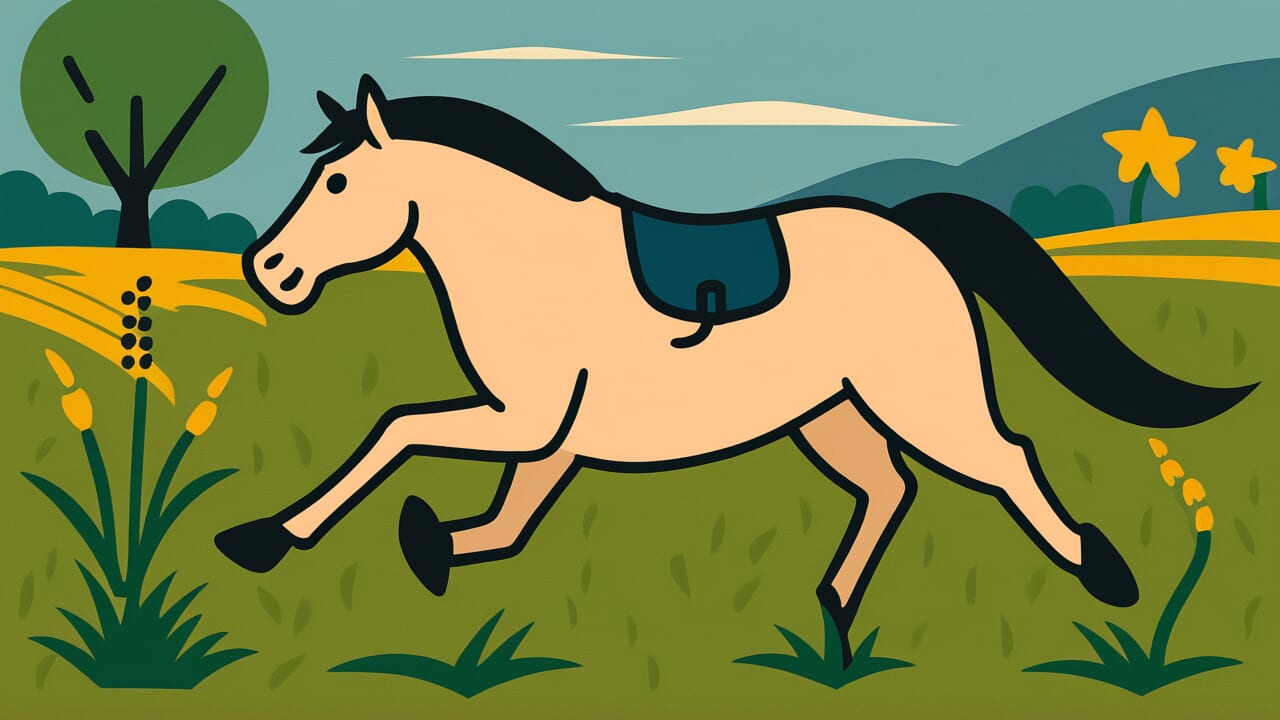How to Read “Like a running horse eating grass”
Hashiriuma no kusa wo kuu yō
Meaning of “Like a running horse eating grass”
“Like a running horse eating grass” describes a situation where things proceed in a choppy, inconsistent way. Progress is uneven and not smooth.
The proverb refers to a state where you can’t focus on one thing. You keep starting and stopping, just like a horse trying to eat grass while running.
People use this proverb when work or tasks don’t go as planned. For example, when your work gets interrupted repeatedly.
It also applies when your concentration breaks and progress becomes unstable. Or when outside interference disrupts your work rhythm.
The impossible state of trying to run and eat at the same time perfectly captures this lack of smooth progress.
Even today, this proverb fits modern situations well. Think of constantly interrupted work from emails and phone calls.
Or when multiple tasks leave each one half-finished. “Like a running horse eating grass” describes these moments perfectly.
Origin and Etymology
No clear written records explain the origin of this proverb. However, the phrase itself offers interesting insights.
Imagine a horse trying to eat grass while running. Horses naturally stop and calmly eat grass.
But if a horse tries to eat while running, it takes one bite, runs, takes another bite, then runs again. This creates a choppy, broken pattern.
This approach is very inefficient. The horse can’t eat properly or run well.
This expression likely emerged from Japan’s agricultural society. Horses were vital workers, and people observed horse behavior daily.
People who cared for horses knew the difference well. They saw when horses ate calmly versus when something interrupted their feeding.
Running and eating are two separate actions that should happen independently. Trying to do both at once creates an impossible contradiction.
This contradictory situation perfectly expresses when things don’t go smoothly. The proverb reflects Japanese people’s sharp observation skills.
It also shows how Japanese culture values natural, proper ways of doing things.
Interesting Facts
Horses almost never eat grass while running in real life. As herbivores, horses spend most of their day standing still and grazing.
Running and eating are clearly separate behaviors for horses. This is exactly why the proverb works so well.
It represents “an impossible, unnatural state” that shouldn’t happen.
Interestingly, horses interrupt their feeding because of wariness. Wild horses must stay alert for predators while eating.
They constantly watch their surroundings during meals. This instinctive behavior pattern may have made it perfect for describing choppy, interrupted states.
Usage Examples
- I started a new project, but dealing with other work keeps interrupting me. It’s like a running horse eating grass, and I’m making no progress.
- I finally started studying, but my family kept talking to me. It was like a running horse eating grass, and I couldn’t concentrate at all.
Universal Wisdom
“Like a running horse eating grass” contains a fundamental truth about human activity. It teaches that focus and continuity are essential for quality results.
Why was this proverb created and passed down through generations? Because humans constantly struggle between efficiency and impatience.
When we have many tasks, we try to handle multiple things at once. But like a horse eating grass while running, we end up doing both things poorly.
This state comes from human anxiety. We want quick results, hate wasting time, and want to accomplish everything.
But our ancestors understood something important. True efficiency comes from settling down and focusing on one thing at a time.
Choppy states don’t just come from outside interference. They also come from our own restless minds.
This proverb teaches the importance of calmly facing things one at a time. It uses the familiar image of a horse to convey this lesson.
Times change, but this wisdom never fades.
When AI Hears This
The human brain has strict limits on how much information it can process simultaneously. Psychology experiments reveal this clearly.
When people count basketball passes in a video, about half miss a person in a gorilla suit walking through the scene. This is called “change blindness.”
A running horse eating grass perfectly embodies this cognitive mechanism.
What’s notable is that eating grass is an instinctive need for horses. Yet when brain resources focus on running, even that need gets suppressed.
Brain science describes attention as a spotlight effect, like a flashlight beam. The illuminated area is clear, but everything else literally becomes “invisible.”
Interestingly, this isn’t about willpower. It’s a physical constraint of the brain’s information processing capacity.
This theory holds important meaning for modern society. Pedestrians using smartphones don’t notice their surroundings, causing many accidents.
Their attention focuses on the screen. Obstacles in their field of vision simply aren’t recognized cognitively.
Meanwhile, professional athletes achieve amazing performance in the zone state. This uses the same mechanism differently.
The running horse has been teaching us about this dual nature of human cognition for over a thousand years.
Lessons for Today
This proverb teaches modern people about “the courage to create boundaries.”
Modern society bombards us with distractions. Smartphone notifications, incoming emails, and social media updates constantly grab our attention.
As a result, many people spend their days like a running horse eating grass. But what truly matters is consciously creating time for focus.
Practical steps help. Turn off notifications during important work. Don’t think about other things for a set period.
Don’t move to the next task until you finish the current one. These aren’t just time management techniques.
They represent a life choice. You’re deciding what truly matters in your life and giving it proper time and attention.
Escaping choppy states requires more than organizing your environment. You must also calm your own mind.
Anxiety and impatience often drive us into a running horse state. One thing at a time, done carefully.
This accumulation is what enriches your life.



Comments